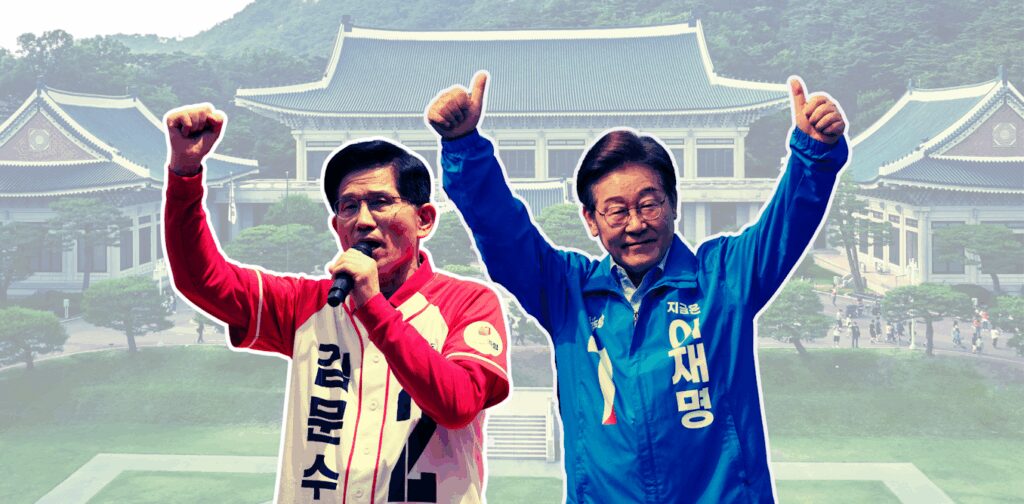On June 3rd, South Korea will hold a pivotal election to select its next president, marking a potential turning point in the nation’s political landscape. This election is set against the backdrop of one of the most turbulent and divisive periods in South Korea’s democratic history since the late 20th century.
The country has been navigating a deepening political crisis since December, triggered by President Yoon Suk Yeol’s controversial and unprecedented declaration of martial law.
Yoon’s order to prevent lawmakers from entering the National Assembly led to a tense standoff that lasted through the night, culminating in a dramatic confrontation. His attempt to impose martial law was ultimately overturned after a six-hour legal battle, highlighting the constitutional limits of executive power.

Han Myung-Gu/EPA
The fallout from this crisis was equally intense: President Yoon was impeached and removed from office after a protracted process that concluded only in April.
This period was marked by widespread protests-both in support of and against Yoon-alongside a violent assault on a courthouse and physical clashes between investigators and Yoon’s private security team.
Meanwhile, South Korea has experienced a rapid turnover of interim leaders, cycling through three caretaker administrations in quick succession.
Amidst robust economic growth and rising living costs, coupled with a tense security environment, South Korea faces a pressing need for decisive and capable leadership to steer the nation through these turbulent times.
Leading Contenders for the Presidency
At the forefront is Lee Jae-myung of the Democratic Party, widely regarded as the leading candidate to succeed Yoon, having narrowly missed victory in the 2022 presidential race.
Recent polls suggest Lee maintains a commanding lead, with approximately 49% support as the election approaches, comfortably ahead of his main rival.
His closest opponent, conservative candidate Kim Moon-soo, trails significantly at around 35%, while Lee Jun-seok, another conservative contender, garners about 11%. Notably, for the first time since 2007, no female candidates are vying for the presidency.
The strong backing for Lee indicates a widespread desire among voters to reject the authoritarian overreach exemplified by Yoon’s martial law declaration.
Kim, who served as Minister of Labor under Yoon, has publicly apologized for the martial law episode, yet critics continue to scrutinize his stance. His campaign aims to unite moderates and mainstream conservatives who oppose the previous administration’s heavy-handed approach, while also addressing conspiracy theories about election fraud propagated by some factions-an issue Yoon continues to endorse.

Ahn Younger-joon/AP
Candidate Profiles and Political Backgrounds
Lee Jae-myung’s personal journey resonates with South Korea’s narrative of resilience and upward mobility. Born into poverty, the specifics of his birth date remain unrecorded. From a young age, he worked in factories, sustaining injuries in an industrial accident during his childhood.
He later earned a scholarship to study law, emerging in the late 1980s as a prominent labor lawyer and activist. His activism gained prominence when he famously scaled a fence to enter the National Assembly and oppose Yoon’s martial law in December. He has drawn comparisons to U.S. populist figures like Bernie Sanders, emphasizing his outsider status and advocacy for the common people.
In recent years, however, Lee has adopted a more centrist tone, aiming to appeal to moderate voters and even some conservatives. This strategic shift helps him counter accusations from the left that he is a “red” sympathizer or aligned with North Korea or China, accusations often used by his opponents to discredit him.
Nevertheless, Lee faces significant legal challenges, including allegations of corruption related to land development projects. Such charges, frequently highlighted by his rivals, could threaten his electoral prospects if proven in court.
Major Policy Concerns and Campaign Focus
While international observers often focus on North Korea’s nuclear ambitions, South Koreans are more concerned with domestic economic stability. The upcoming president’s approach to revitalizing the economy is a top priority for voters.
Lee has promised to establish an emergency economic task force immediately upon taking office to address pressing financial issues.
Energy policy remains a contentious topic. Kim advocates for expanding nuclear power, aiming for it to constitute about 60% of South Korea’s energy mix. Conversely, Lee has expressed reservations about nuclear energy’s safety and sustainability, calling for a halt to the expansion of new reactors.
Additionally, constitutional reform is on the agenda. Both candidates support modifying South Korea’s presidential system to prevent the concentration of power-an issue rooted in the 1987 constitutional overhaul that introduced direct elections and a single five-year term. Both favor changing the system to a four-year, renewable two-term model similar to that of the United States.
Anticipated Challenges on the Horizon
On the international front, the new president will need to navigate complex relations with the United States, especially regarding trade policies. In April, the U.S. imposed a 25% tariff on South Korean exports, which was temporarily reduced to 10% but remains a point of contention.
Yoon Suk Yeol’s efforts to align with former U.S. President Donald Trump, including practicing golf to foster rapport, exemplify the diplomatic balancing act South Korea faces. The incoming leader will need to continue this delicate diplomacy while addressing domestic issues.
Domestically, the challenge lies in healing a polarized society fractured by misinformation and political rivalry. Restoring unity and trust in democratic institutions will be crucial, especially after a presidency marked by heightened division and disinformation campaigns.

